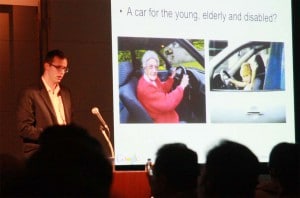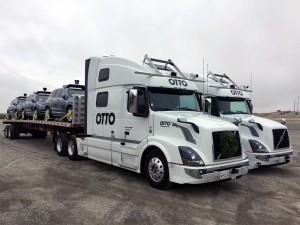(This story has been updated with an additional comment from Anthony Levandowski’s attorney.)
Anthony Levandowski, one of the pioneers in autonomous vehicle technology has filed for Chapter 11 protection, a move taken in response to a court order to pay $179 million to Google, one of his former employers, as a result of a contract dispute.
The tech giant accused Levandowski of violating his agreement, along with taking trade secrets, when he left Google in 2016. He then formed his own company, Otto, which was subsequently taken over by Uber. Levandowski then found himself at the center of a bitter, high-profile dispute between Google and Uber before being fired by the ride-sharing company.
“Anthony had no choice but to file for bankruptcy to protect his rights as he pursues the relief he is legally entitled to,” Levandowski’s attorney, Neel Chatterjee, said Thursday.
(Uber fires autonomous vehicle chief Levandowski.)
Levandowski, who turns 40 this month, was an early proponent of autonomous vehicles, leading the development at Google which eventually spun off its research efforts. Now operating as a subsidiary of Google parent Alphabet, Waymo has begun operating a self-driving ride-share service in the Phoenix area and eventually plans to expand to other markets.
Once the head of the autonomous unit at Google, Levandowski left shortly after the operation brought in as its new boss John Krafcik, former CEO of Hyundai Motor America. Levandowski then formed his own company, Otto, to focus on self-driving trucks.
In turn, it was purchased by Uber in 2016. The ride-sharing service has long focused its own research on the driverless vehicles it believes will slash its hefty losses.
But Uber was hit, almost immediately, by a lawsuit from Google which claimed the ride-sharing service was taking advantage of trade secrets that Levandowski had taken with him when leaving Google. Uber subsequently fired Levandowski in May 2017, alleging he didn’t properly comply with the service’s own internal investigation into Google’s claims.
(Former Google employee charged with stealing company secrets.)
Uber and Waymo settled their own dispute a year later. The Google spinoff originally sought $1.8 billion. The settlement gave it 0.34% of Uber’s equity. At the time, the ride-sharing service was valued at $72 billion, making the agreement worth about $245 million.
Levandowski was targeted by a separate lawsuit, however, which went to arbitration, a panel subsequently issuing an “interim award” of $127 million. But a judge this week raised that to $179 million after adding in interest and legal fees.
For his part, the long-time autonomous engineer has claimed that he should be indemnified against the judgement by Uber. The company has so far refused to do so, though it issued a securities filing this week noting that, “whether Uber is ultimately responsible for such indemnification is subject to a dispute between the Company and Levandowski.” If it eventually would be forced to do so, Uber said in the filing, it could face “a possible loss of up to $64 million or more.”
“We will continue to take the necessary steps to ensure our confidential information is protected as we build the world’s most experienced driver,” Waymo said in a statement following the announcement of the penalties against Levandowski.
Speaking on behalf of Levandowski, attorney Chatterjee countered Waymo’s statement, asserting, ““This arbitration was not about trade secrets but about employees leaving Google for new opportunities and an engineer being used as a pawn by two tech giants. Google fought tooth and nail to take back every penny paid to Anthony for his multibillion dollar contributions and now Uber is refusing to indemnify Anthony despite explicitly agreeing to do so.”
The Google spinoff initially alleged that its former chief autonomous engineer had loaded thousands of internal files on his own hard drive before leaving the company. And that has triggered more than just a civil lawsuit.
(Uber shuts down Otto autonomous truck division.)
Last August, Levandowski was hit with a 33-count federal indictment for allegedly stealing trade secrets. He has pleaded not guilty but could face up to 10 years in prison if a jury disagrees.



